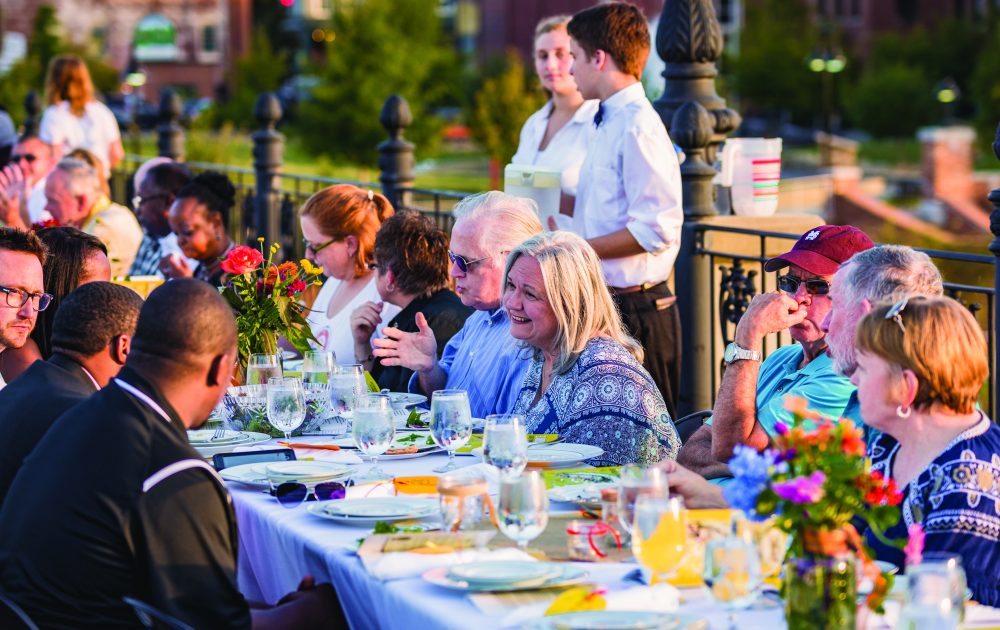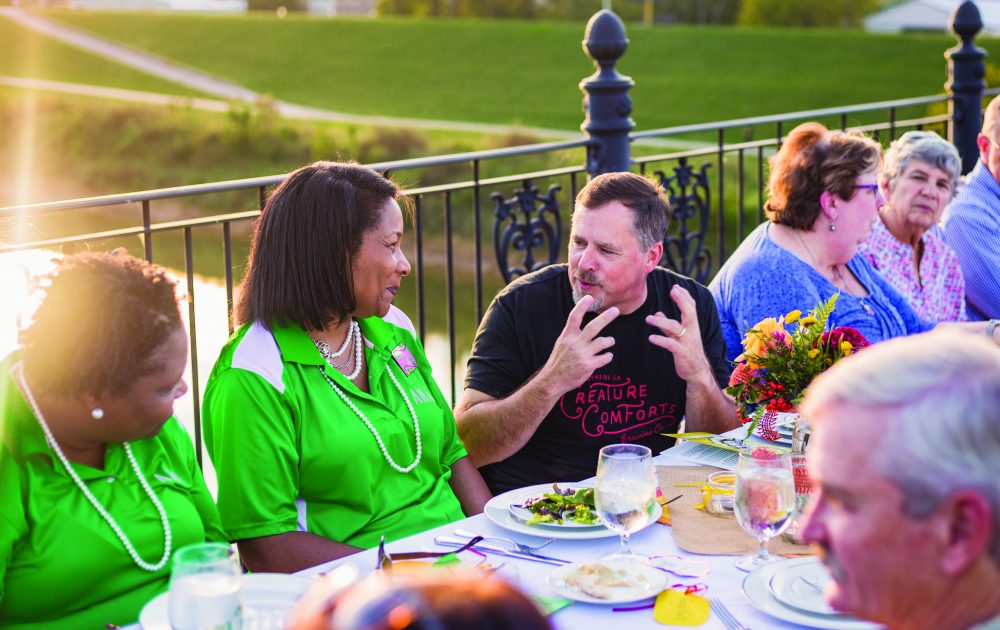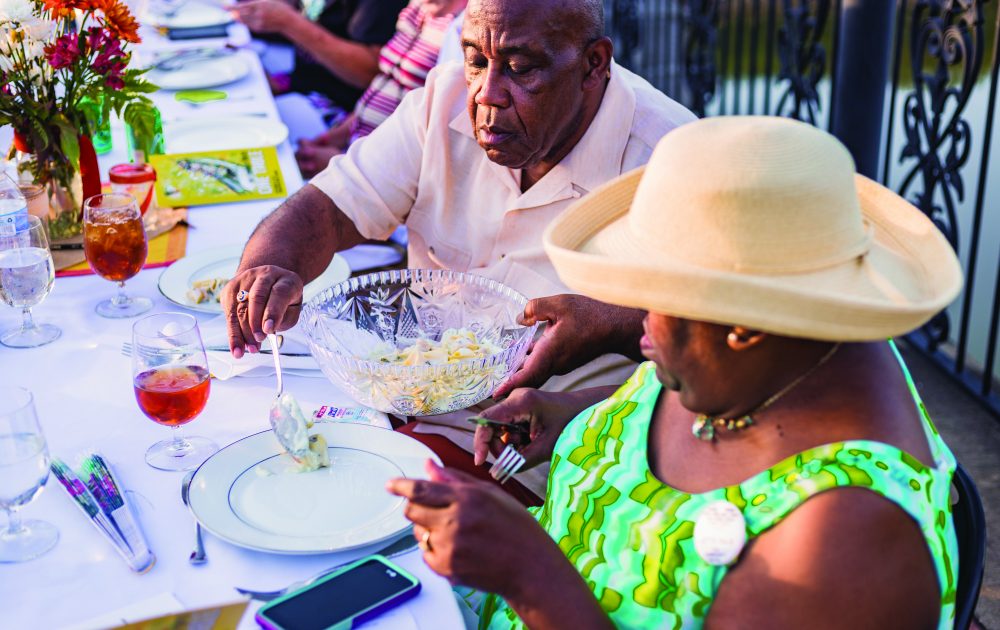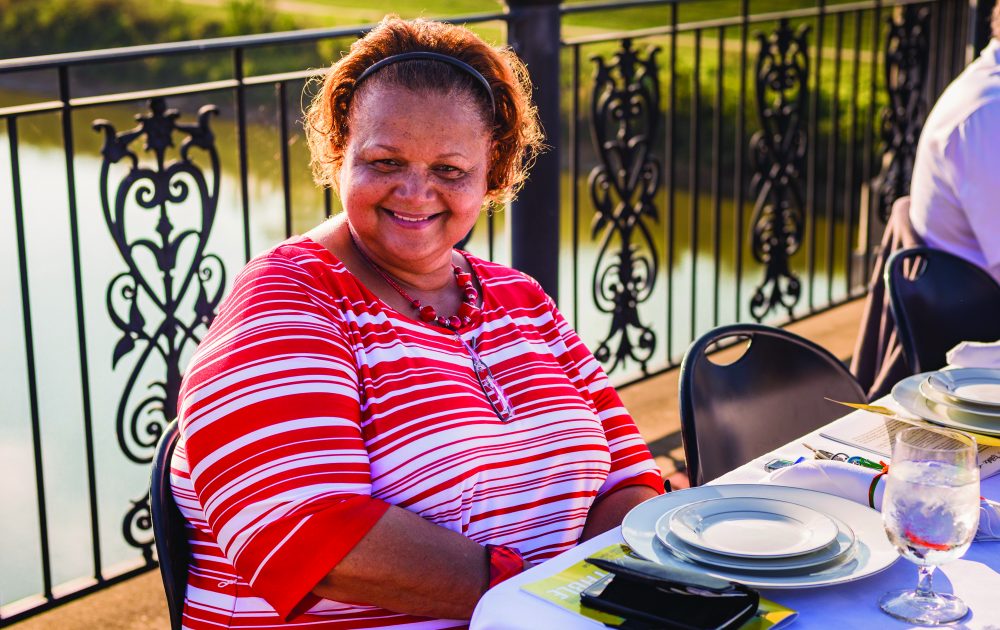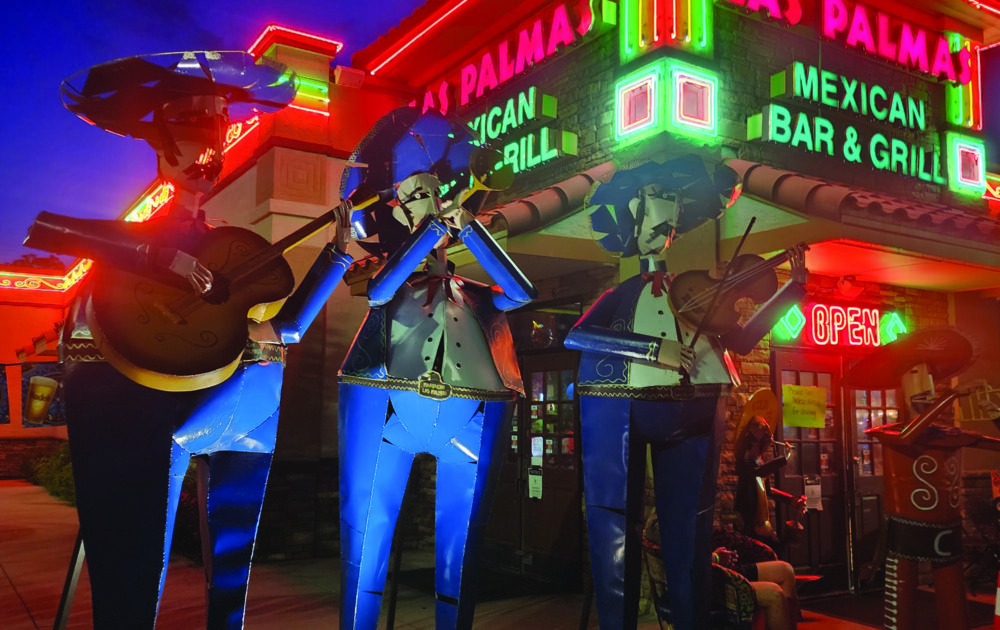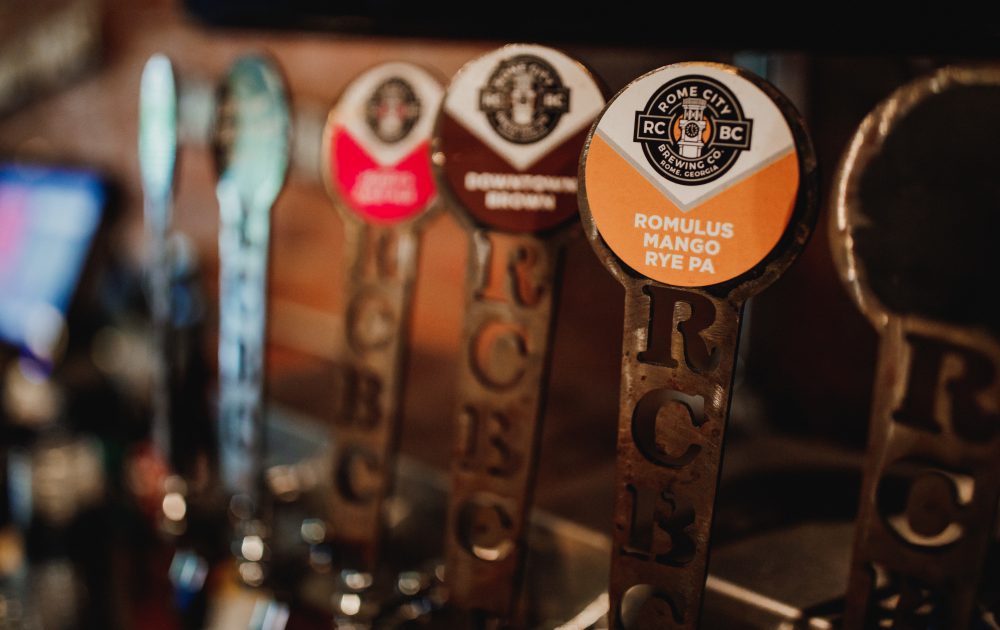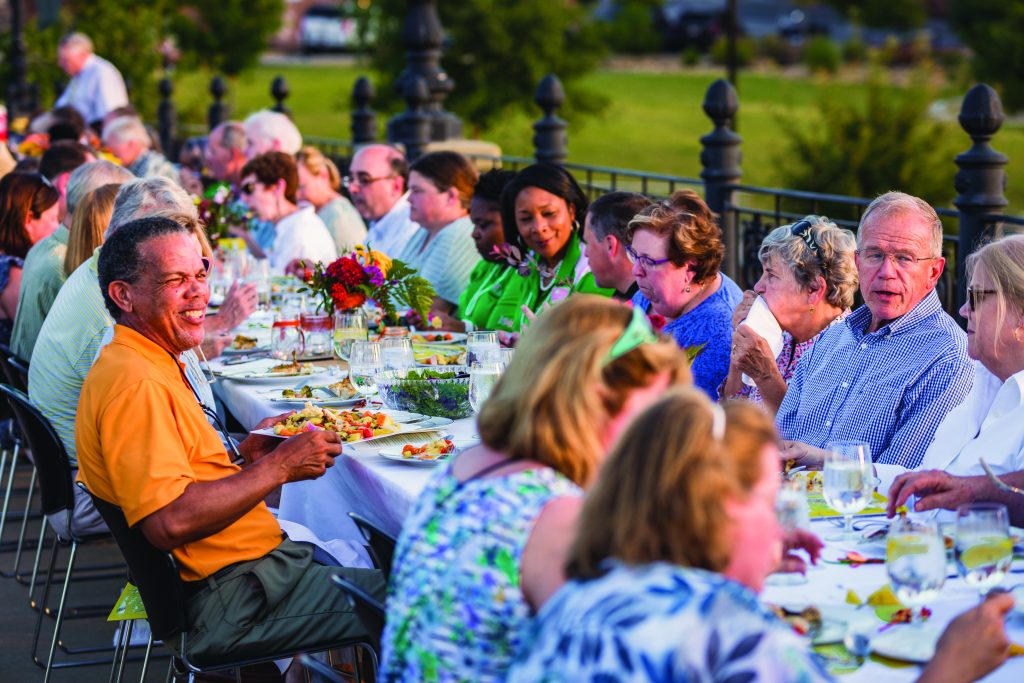
Photos by David Johnson
On a bright, early fall evening, children run through the fountain at the town green, intent on squeezing every drop out of the summer heat. A lone woman in a kayak paddles up stream and the sun is determined not to give up a season so easily. Spread across the walking bridge from the Town Green to the north side of the river, table after table sit end to end, adorned with fresh flowers and place settings for 220 people. On this particular Sunday, Puerto Rico is reeling from Hurricane Maria, North Korea is shaking a fist at America, and all eyes are focused on whether NFL football players will take a knee during “The Star-Spangled Banner”. But in Rome, the community has gathered for dinner, because no matter what happens around us, we all have to eat.
 Nedra Manners, co-owner of Yellow Door Antiques, wearing a sundress and holding a clipboard, directs diners to their seats. She and a team of volunteers have planned this dinner, called One Table, for months.
Nedra Manners, co-owner of Yellow Door Antiques, wearing a sundress and holding a clipboard, directs diners to their seats. She and a team of volunteers have planned this dinner, called One Table, for months.
Manners is a member of One Community, a local group dedicated to promoting racial harmony at the local level. Their idea was to bring different groups of Romans together for a meal. Manners says that, “when we put aside politics or religion, and we just sit down to talk, we realize we have more in common than we assumed.”
Manners has lived in Rome for decades, and like most people she had been living her life habitually. She drove the same route to the grocery store, sat in the same place at church, socialized with the same friends. Her circle of neighbors, when boiled down, was pretty small. Manners felt like she could be more involved, more invested in her own town, and that she could stand to make some new friends from other parts of the city. She attended a One Community meeting and liked what she found. She found different creeds and colors, different political affiliations and socioeconomic tiers. She also found new friends and new perspectives.
She started attending small group meetings sponsored by One Community and from there, she made it her goal to attend city council meetings. Manners saw a weakness in her life and addressed it. On the day of the One Table event, Manners wanted to share what she had found with others.
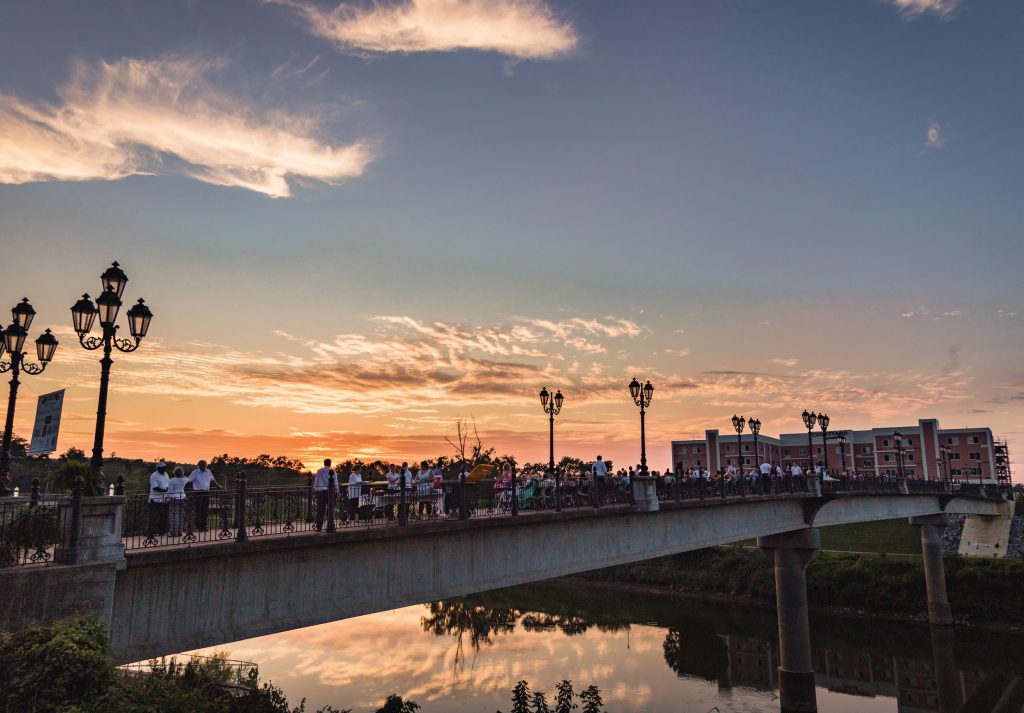
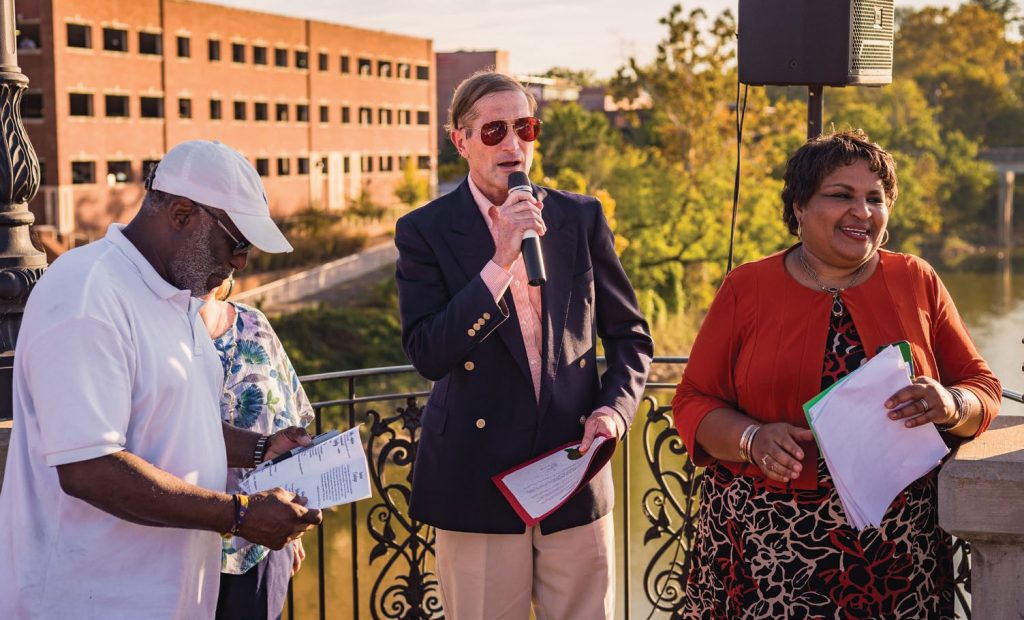
The purchase of a ticket for the event entitles the buyer to two seats at the table, and a third ticket for someone else in the community. One Community identified agencies in Rome that focus on helping lower income brackets, immigrants and recovering addicts as well as community building groups to receive the additional tickets. To ensure attendees did not sit in clusters of friends, the organizers created a seating chart. the “The goal is to make sure everyone sits near a stranger,” Manners explains.
Before the dinner begins, Charles Love, a member of the One Community board, introduces the program for the evening. For a group doing such radical, seemingly political work, Love and the rest of the board built One Community on a concept that intentionally cuts religion and politics out of its work. Members attend a variety of places of worship, or none at all. They are card carrying members of both major political parties, and some of the smaller parties. They may hold ideological differences, but when they unite at One Community meetings and events, they work hard to keep all of that out of the conversation. Love says, “It’s about talking. Just talking, with no agenda. When we talk to people who aren’t like us, we realize we’re more alike than we are different.”
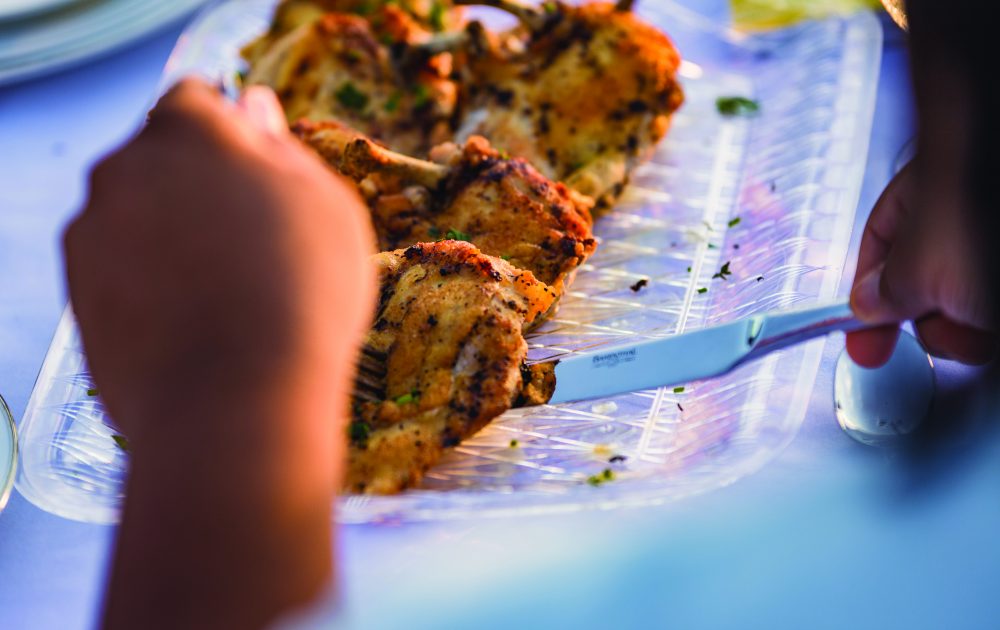
In order to keep the dinner free from these tethers, diners observe a moment of silence after a formal proclamation from Mayor Jamie Doss. A live band plays while the guests sing “America the Beautiful”. Each of the courses have names that support the “Menu for Unity;” Humility, Empathy, Courage, Perseverance, Love and Joy. One Community members read short poems or speeches to signify these ideas. And then guests tuck into plates of locally-grown, locally-sourced and locally-made foods.
Love and Manners walk the length of the bridge during dinner, working the crowd and inviting conversation. Berry College students, dressed in crisp white shirts and black trousers, pour iced tea for diners as part of their community service requirement, while small clutches of strangers become acquaintances and then friends. Conversation starts slowly, but soon rises to hit on topics like Georgia football and the arrival of fall. A quiet row of police officers is drawn into lively chatter with the people across the table from them. The band sends music over the crowd to fill pauses in conversation as guests settle into the spirit of the event.
 One of the reasons Love was drawn to the work of One Community was the racial unrest he has witnessed in other parts of the country. He explains that the group was founded by Ken Fuller after events in Ferguson, Missouri, to be proactive against that type of violence in Rome. Fuller relies on a report from the Justice Department and the work of writers and activists to form the backbone of his group. Love joined the group because he believes that conversation and community can be a force for good.
One of the reasons Love was drawn to the work of One Community was the racial unrest he has witnessed in other parts of the country. He explains that the group was founded by Ken Fuller after events in Ferguson, Missouri, to be proactive against that type of violence in Rome. Fuller relies on a report from the Justice Department and the work of writers and activists to form the backbone of his group. Love joined the group because he believes that conversation and community can be a force for good.
As if to put a fine point on that message, Love makes sure to acknowledge the law enforcement officers in attendance. “Sometimes,” he says, “the relationship between residents and officers can be a strain on a community. This dinner and this organization is working toward building better relationships for all parts of the community.”
Getting guests to attend a dinner where they would be restricted to sitting by veritable strangers sounds like an impossible task, but Manners says that the tickets sold out three weeks before the event. Because it was so popular, the group plans to make the dinner an annual Rome occasion, in addition to its usual work of talking to neighbors and seeking understanding. Every detail of the event is meant to inspire different people from different places to talk. Love encapsulates the purpose well saying, “I want to get to know you so I realize you’re not so different from me.”
This is the work of One Community, to build the relationships that lead to the deeper conversations, one dinner at a time.

